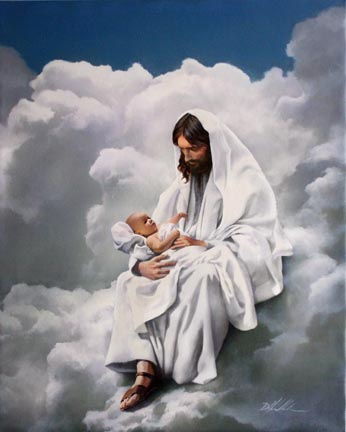
Divine love is bound by a law. Love has a law where God is concerned. God's love is under a law. God's love is under the law of the glory of God, and He can show His love only in so far as showing His love is going to be to His glory. He is governed by that. In all the showings of His love, His object is that He may be glorified, and the glory of God is bound up with resurrection. "Said I not unto thee, that if thou wouldest believe, thou shouldest see the glory of God?" "Thy brother shall rise again." The glory of God is in resurrection, and therefore love demands that everything shall come to the place where only resurrection will meet the situation; no curing of things, no remedying of the old man.
Oh, let me start right back at the beginning if it is necessary. There are still a lot of people in this world who think that there is something in man that can contribute to the glory of God and that Christianity is only the bringing up out of man of something that is for the glory of God. That is a long-, long-standing fallacy and lie. It is not true. Call it what you like; it goes by various names, such as 'the inner light' or 'the vital spark'. The Word of God all the way through is coming down tremendously on this thing. I start at zero, and zero for me means that I can contribute nothing. Everything has to come from God. The very fact that the gift of God is eternal life means that you have not got it until it is given to you. You are blind until God gives you the faculty of sight. You are dead until God gives you life. You are a hopeless cripple until God does something for you and in you which you can never do. Unless God does this thing, unless this act takes place, well, there you lie. Spiritually, that is how you are. You can contribute nothing. Nicodemus, you have nothing to give, you must be born again; I cannot take you at the point at which you come to Me! Woman of Samaria, you have nothing, and you know it and confess it: that is where I begin! Man of Bethesda, you can do nothing, and you know it: then it all rests with Me! If ever there is to be anything, it rests with Me! Lazarus, what can you do now, and what can anybody make of you? If I do not come right in as out from heaven and do this thing, then there is nothing but corruption!
This is one of the great lessons that you and I have to learn in the School of Christ, that God begins for His glory at zero, and God will take pains through the Holy Spirit to make us to know that it is zero; that is, to bring us consciously to zero, and make us realize it is all with Him. You see, the end is always governing God, and the end is His glory. Take that word through this Gospel again—the glory of God in relation to Christ. We were saying in a previous meditation that God's great end for us in Christ is glory, fullness of glory. Yes, but then there is this—that no flesh should glory before Him. And where does that come? —"He that glorieth, let him glory in the Lord" (1 Cor 1:29-31). And what is that connected with?—He "was made unto us wisdom from God, and righteousness and sanctification, and redemption: that, according as it is written, He that glorieth, let him glory in the Lord". It is a question of what He is made to be. No flesh is to glory before Him. "My glory will I not give to another" (Isa 42:8; 48:11). Therefore it is all the Lord's matter and He will retain it in His own hands. "And when he had heard . . . he abode two days . . . where he was" (John 11:6). In love, governed by love, that the glory of God might be revealed, He kept away.
Have we got settled on this? We take so long to learn these basic elementary lessons. We do still cling to some sort of idea that we can produce something, and all our miserable days are simply the result of still hoping that we can in some way provide the Lord with something. Not being able to find it, but breaking down all the time, we get miserable, perfectly miserable. It takes us so long to come to the place where we do fully and finally settle this matter, that if we lived as long as ever man lived on this earth, we shall not be able to contribute one iota which can be acceptable to God, and which He can take and use for our salvation, for our sanctification, for our glorification, not a bit. All that He can use is His Son, and the measure of our ultimate glory will be the measure of Christ in us, just that. There will be differences in glory, as one thing differs from another. One glory of the sun, another of the moon, another of the stars. There will be differences in degree of glory, and the difference in degree of glory ultimately will be according to the measure of Christ that each one of us severally has. That in turn depends upon how much you and I by faith are really making Christ the basis of our life, the very basis of our living, of our being, how much the principle of these familiar words has its application in our case, 'Not what I am, but what Thou art'. Christ is all the glory, 'the Lamb is all the glory in Immanuel's land'.
Beloved friends, whatever you go away with, go away with this, that from God's standpoint, the glory of life depends entirely upon our faith apprehension, appropriation and appreciation of Christ, and there is no glory at all for us now or in the time to come but on that ground and on that line. I know how simple that is, how elementary, but oh, it is such a governing thing. Glory—that the Lord shall be glorified in us. What greater thing could happen than that the Lord should be glorified in us? The glory of God is bound up with the resurrection, and resurrection is God's unique and sole prerogative. So that if God is to be glorified in us, you and I have to live on Him as the resurrection and the life from day to day, and know Him as that as we go through life.
The School of Christ - T. Austin-Sparks







